Text
Expert in fisheries and the plague
Hello my friends and family!
Habari za mvua? Or: how is the rain? The question of the day, because it has been raining for 1,5 days, and if I say rain I mean rain. Half the city is already flooded, I heard of parts of the road that are completely closed, and houses that have been flooded. One big adventure for me, but the part where I live is of course one of the richest neighbourhoods in the city. And this is only day two of the small rainy season, so I am curious what the big one will be like. They call these the mango rains, so at least we can console ourselves with the thought that we will soon have mangos every day.
So, how is everybody doing? I know I am terrible at skyping with everyone and answering all emails and messages, sorry about that. Previous times when I was abroad I had much more time, but life is just so busy here (which is no excuse I know). So let me try to give you a little glimpse of my life now. Last week I spent house- and dog-sitting for one of my colleagues, who was on holiday. And we all know what that means: huge expat house, pool, GOOD coffee machine and a cute dog! In other words: pool parties all week, I definitely increased my popularity levels (ha ha) and I did not know what to do with the embarrassing number of empty bottles by the end of the week. ;) Tried to hide them in the cleaning closet, didn’t work haha. But for real, it was wonderful to stay in a cosy and well-furnished house, with a comfortable couch and a big garden. Although the guards showed a little bit too much interest in me, I managed to keep them at distance. ;) I have also gotten a second housemate in my apartment, Deborah. She is from Tanzania and plans to go to the Netherlands soon, and it is fun to have someone else around! Oh, and I have a weekly Swahili class now, with three friends, so Monday from 5-7 we sit in this small room in a tiny language school, and get taught by a very patient and enthusiastic teacher, Msigaro. It is a lot of fun (although a Monday lasting from 7-7 is quite long) and we are definitely making progress, but the verbs are becoming very complicated. They basically manage to squeeze the entire sentence into one long word, so to try and figure that out is quite the challenge when the Tanzanians are always speaking at top speed. Swahili is a funny mix of Bantu (a group of African languages), Arabic, and a bunch of others. Especially the words derived from English are my favourite, because they put an i behind everything: lefti? Righti? Paty? Waini!

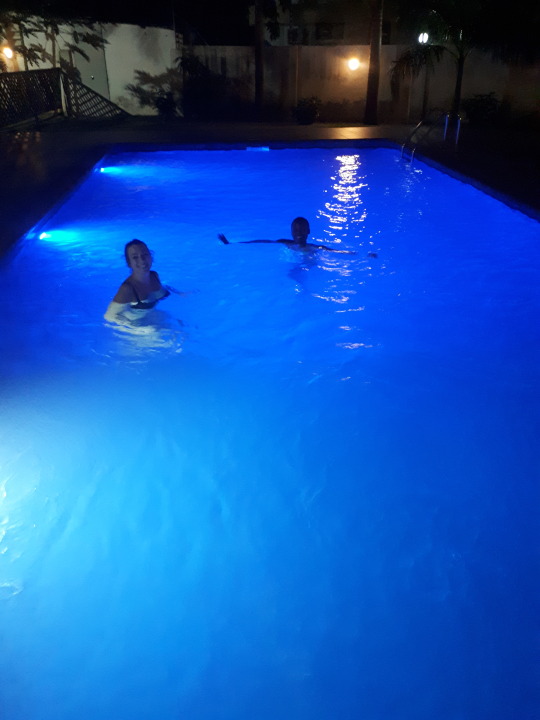
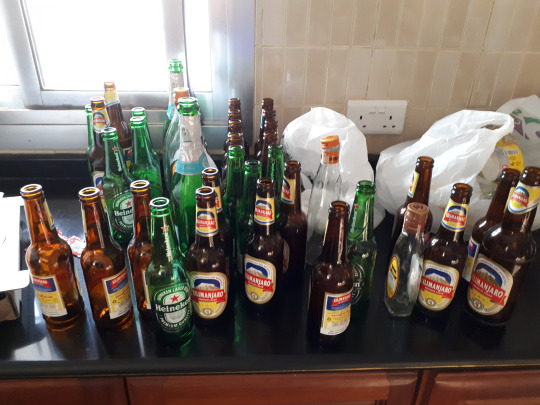
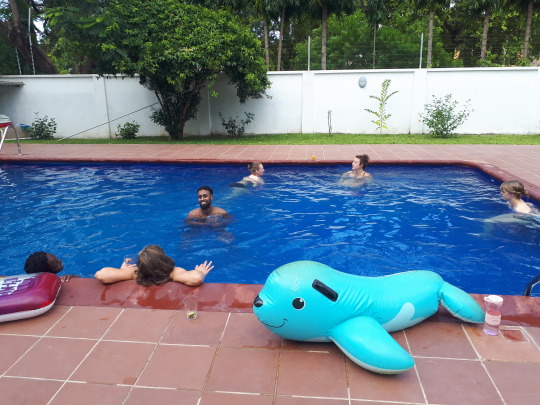

Things at the Embassy are going well. The most important news is that our Ambassador has presented his credentials to the President yesterday, so we are officially represented again! A good reason for us to eat cake. It had already been planned before, on a Sunday at 8 AM, but I guess the President decided he did have to go to church in the end. In the meantime, we have been working on a hundred different things. Our annual plan has been written and is now awaiting approval from The Hague. I have been gathering information about Madagascar, where the plague has broken out (yes, the one from the Middle Ages), to update information on the website. I can thus now proudly say I am a plague-expert. I have also been working on the Netherlands’ contribution to Mauritius 50-year independence, on a human rights movie event, and I went to a workshop about waste management. Perhaps I already said this before, but one of the projects the Embassy is assisting in, is the improvement of Dar’s waste management infrastructure. The biggest landfill will (hopefully) be rehabilitated, which will make it healthier for the people living and working there, and recycling facilities will be introduced. The workshop was about how to change people’s behaviour, via incentives and nudging. I think that’s a fascinating question, if you consider people’s behaviour regarding waste here: they throw everything on the ground. There is no education about this, so the difference between a banana peel and a plastic bottle is really no common knowledge. So often I have been in a car and the driver will just throw his plastic waste out of the window. Or sometimes you can’t swim in the sea because it is so dirty and smelly. It is just such a different perception than we have, and so difficult to change or even grasp. But very necessary nonetheless. Oh, and of course, I have been working on a sustainability project for the Embassy! As part of the Rank your Embassy-initiative, a ranking between Dutch embassies worldwide, I interviewed all staff-members and wrote an article about it (which will soon be online). I also prepared a powerpoint presentation about our sustainable practices, so for a week I made people walk the stairs and eat less meat and recycle. Some of the expat staff now even walks once a week to the Embassy, and we try do carpooling (aka me forcing people to give me a ride). The Ambassador presented the presentation at the regional conference in South-Africa, and now all embassies in the region will participate! The next step is of course to keep up our good behaviour, so we will have a group session about this.
Political developments in Tanzania are interesting, though not always encouraging. As you might have seen in the media back home, again a group of people associated with homosexuality has been arrested. The same happened in Zanzibar last month. Charges are “promoting homosexuality”, because the latter group was for example following a workshop on HIV/AIDS. Several HIV clinics have also been closed, so that’s not too good news. Also, schoolgirls who become pregnant are not allowed to return to school anymore. This because they would give a bad signal to other girls, and would not be able to raise their child and continue their education. Only vocational training will be allowed. I had an interesting conversation with an Uber driver about these issues, who was saying with regard to the school girls that it was perfectly fine because they can still go to private schools. Which of course hardly anyone can pay for. Plus they shouldn’t seduce men all the time. Often, girls living in rural areas have to walk for long distances, and get offered a ride by a boda boda (motor) driver. But only in return for something. It is so unfair that they are punished for this! About homosexuality, it was his opinion that people who stay single, choose to become homosexual (or lesbian), thereby choosing to not be a man anymore. So, what more to say. This is just one opinion. Sometimes the things happening in this country are insane and hard to wrap your head around. Because what about the people who have albinism, who are still being hunted and whose body parts are chopped off for spiritual beliefs? Or the elderly widows living in villages, who are believed to be witches (your eyes turning red is one of the signs for this), and are killed? Of course, many things happening are very positive and the economy is growing and all, but these are the human rights issues that fascinate and astonish me. And it touches upon the debate that we constantly had in my human rights classes last year: what is acceptable and what is it, till what point do you meddle in other cultures, or when are you imposing your own views?
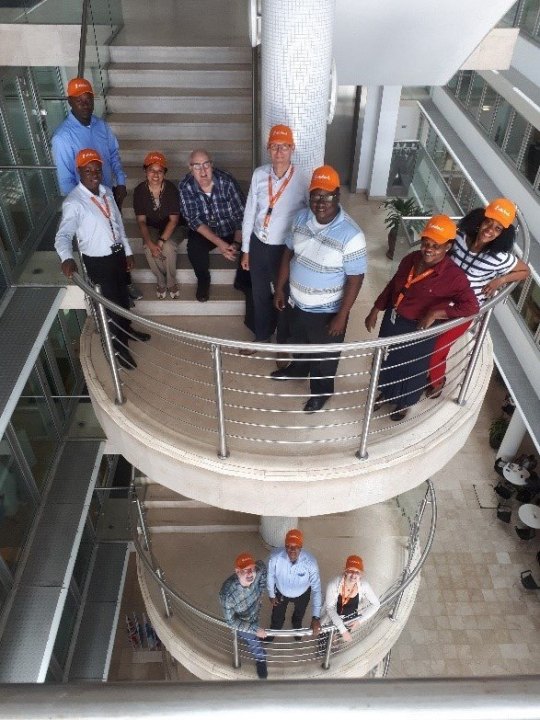
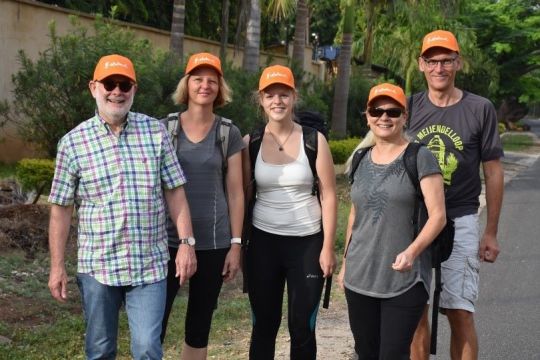
Although it is already some time ago, I also joined on a scoping mission for marine fisheries and aquaculture! Scoping mission scoping mission, what? This is done in preparation of a trade mission, when Dutch companies will visit a country to look for business opportunities, to explore and map out the sector. And somehow, thanks to my amazing colleagues, it was decided that it would be a good idea if I joined! Because next to being a plague expert, you of course all know me as the mastermind of marine fisheries and aquaculture (not). But it was so much fun, and it taught me how cool it can be to delve into a topic that is completely different than your field, but can be interesting nonetheless! Tanzania has a very long coastline, and a bunch of huge lakes, so the question is why the fishing industry has not yet developed that much. Together with Ulrich, our Economics/Trade Officer, and Rik, a trainee from Nairobi, we visited two companies in Dar es Salaam. Funnily enough, there was not one fish to be found in their factories. ;) Turned out it was the low season (the sea is too rough), so just small amounts of fish get processed. If I talk about fishermen, by the way, don’t imagine too much. The few big companies do have fleets, but most fisherman are just guys on surfboard or a tiny tiny boat, who try to catch a fish with one thin line. Or you will see these small wooden boats with 50 people in them, who look like they might topple soon. In some of the coastal areas, there is also a lot of overfishing, disturbing the balance of the ecosystem, and dynamite fishing is a big problem here. Room for improvement and development!
Next morning we took the 7 AM ferry (travelling in royal class, obviously, where you get a tv with your seat but no headset, so everyone is just staring) to Zanzibar, where Omar, a very cheerful man from the ministry who seemed to know everyone on the island, gave us a tour. We visited an anchovies landing site, which I thought was very impressive. There is no dock, so the fishing boats sail towards the coast until they get stuck, from where women carry heavy buckets full of fish to the shore. There, the anchovies is boiled in steaming buckets, sorted on dozens of plastic canvases, and dried in the sun. And then it is transported to end up on your plate. I was shocked by how simple this process still is, and the hard physical labour that is being carried out mainly by women. Next stop was a seaweed farm, which was fascinating – when do you ever learn how seaweed grows? Small bits of seaweed are somehow tied to ropes, growing very fast in the (at that point) low tide water, which is harvested by (again) women. The surroundings were beautiful, and we bought some seaweed soap and –cookies. Seaweed is used in a lot of cosmetics, especially in Europe and the US. Finally, we dropped past the harbour and the fish market.



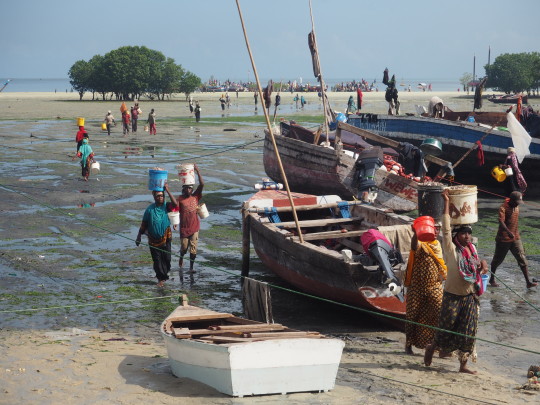
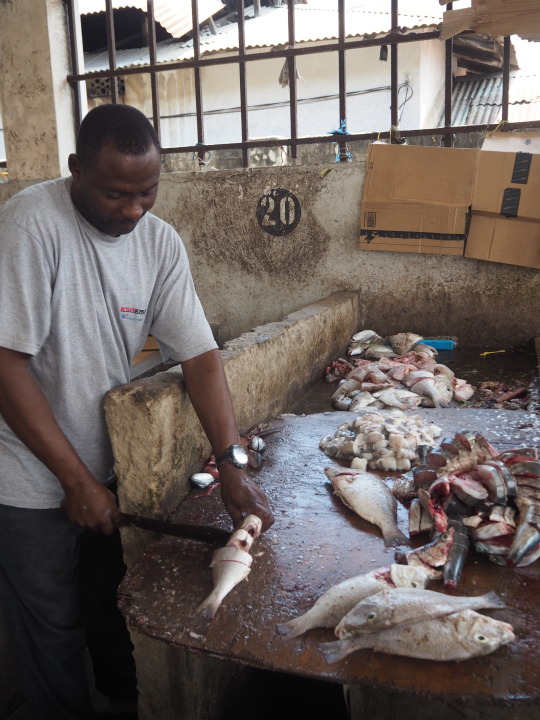

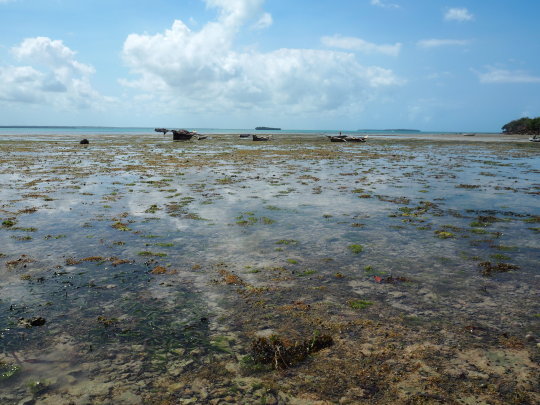


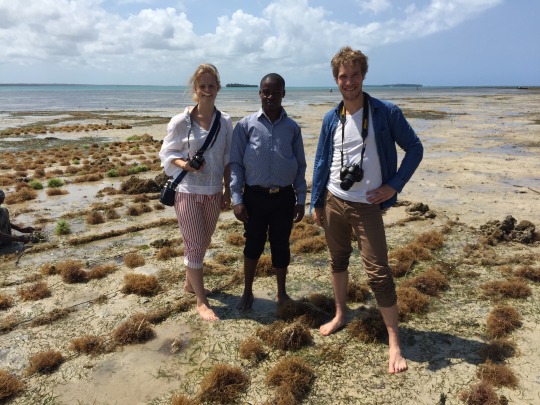
But the most spectacular part of the journey was yet to begin, because we then flew (jaja) to Mafia! This is another big island, 130 km south of Dar, and which is not visited by many people given the high flight costs. Despite the curious name, which is said to derive either from the Yemeni rules from the state of Ma’afir or the Arabic word ‘morfiya’ meaning group and thus archipelago, it was a lovely place to visit. The flight was spectacular, to say the least: in one of those tiny planes with 14 seats, flying over a big river delta called Rufiji, tiny tropical islands (where people actually live, imagine), coral reefs, and I swear I spotted a humpback whale. And guess who got to be the co-pilot!!! Absolutely stunning. Compared to Dar and Zanzibar, Mafia is a very quiet, and I must say quite poor, island. There was one big road from the airport to the other side of the island, big enough for four cars to drive next to each other, but every time we were the only one. We passed thousands and thousands of palm trees, and funnily enough, many of the mud houses had solar panels. While many of the hotels are so exclusive they cost $300 per night, I found a lovely and much more affordable hotel right beside a bay full of sea life, which was, with its diving school and cute bandas (huts), a haven of peace. After a delicious dinner and a good night’s sleep, we were summoned to the ministry first thing in the morning. The gentlemen had not been updated about our arrival, so they wanted to know what we were doing, but they turned out to have a real heart for the island and its marine conservation area. A big part of the island and most of the surrounding waters are a protected marine park, and as a visitor you pay a daily fee for this. We then went to visit another anchovies landing site, bigger and a bit more professional than the one on Zanzibar. And this was so typical: we were put on plastic chairs in a circle, and all the important people from the company joined, and talked at length in Swahili, with some interruptions in English in the meantime. It felt like one of those village meetings, that you so often see in the news or in movies about Africa. Afterwards, we had an hour left so Rik and I swam into the bay and stumbled upon a coral rock with the most beautiful fish swimming around. A brief glimpse of Mafia’s underwater life. It was too short, but I’ll be back! And although I am not entirely sure if fisheries is my new fascination in life, it was extremely interesting and I am very lucky and grateful to have been allowed to join!

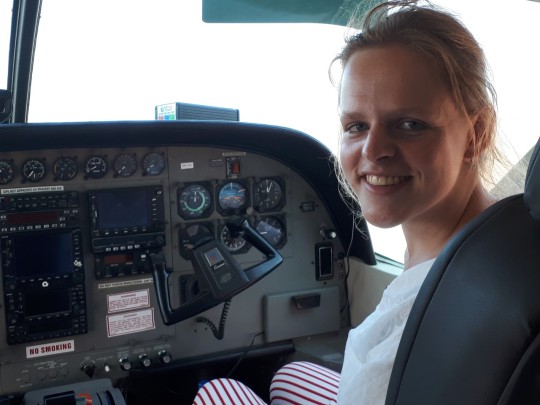


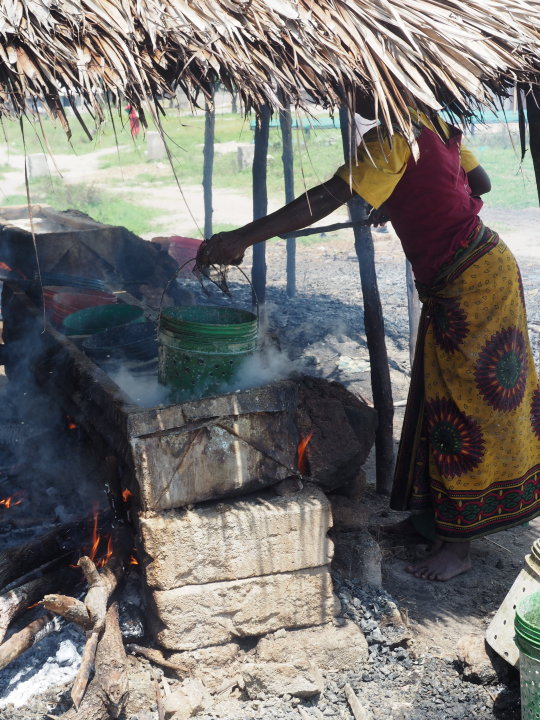


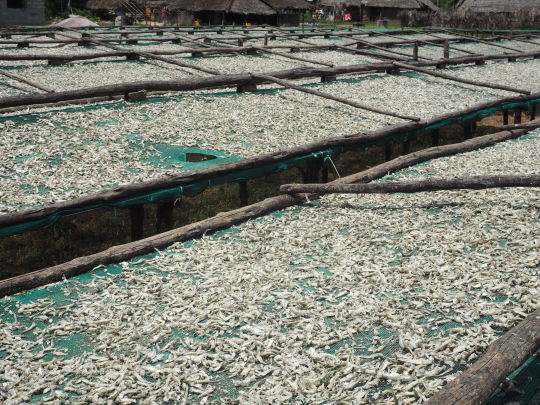
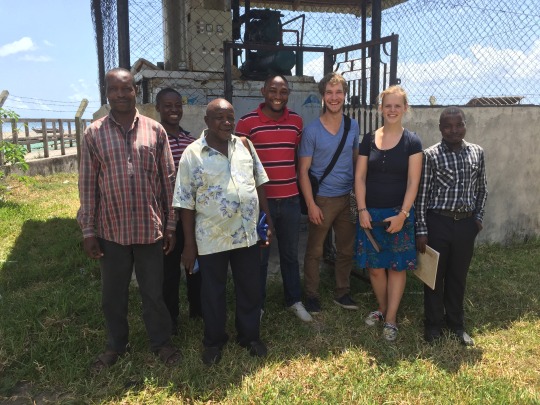
I will force myself to stop here and save the travel adventures for next time. All in all, time flies. Last week the vacancy for my successor was published, which means I am already half way! In December, a second intern specifically for agriculture will come, so I am very excited to get a buddy. This weekend I am going to hike in the mountains (yes of all weekends I chose the most rainy one), so wish me luck. I’ll give you a brief update next week about this and previous travel adventures, before my dad arrives!
Love,
Julie
0 notes
Text
Karibu Tanzania: claim to fame, cockroaches and Zanzibar
Habari za jioni marafiki!
Or: good evening friends!
So much has happened in the past weeks, I don’t know where to start! Some days it feels like time is flying, other days pass really slowly. But all in all, now that I’ve managed to meet more people, life has become way more fun! In this blog I’ll tell you a bit more about my work and the Tanzanian society (with emphasis on Tanzánian), some trips I’ve made and life in Dar.

To start off with some good news: I finally got my residence permit today. Since last Thursday I was residing in the country illegally, so this was a relief. However, when they gave the permit, something went ‘wrong’: instead of giving me a permit for six months, I am now allowed to stay for two years! It was too much hassle for them to change it, haha. Quite ironic, since many foreigners have to leave because they aren’t allowed a permit, but guess which intern did..! Also very nicely, it is written that ‘my wife and children’ are not allowed to be employed. You of course all know that only male expats are allowed in this emancipated country… ;)


Things at the embassy are going very well and I am enjoying (nearly) every day. On the one hand I feel like I have figured out a lot already about how everything works, on the other hand half of the time I still don’t understand the conversations going on during lunch. But I am getting there! So in my daily work, I have a few set tasks: handling the applications for small development projects, updating the website and facebook (like like please!) and writing a concise report of the weekly policy staff meeting (which was cancelled for my first five weeks or so, but oh well). Besides that, I take up anything that comes along: I’ve attended two UNHCR meetings about the situation in Burundi and have written reports about it, I am working on a project for Mauritius, I went to a conference about the circular economy (finally something about sustainability!), and so on. By the way, did you know that Tanzania hosts some of the largest refugee camps in the world, where over 240,000 refugees from Burundi stay? Mind-blowing, isn’t it.
In general, I just try to attend interesting meetings when- and wherever I can. For example, I went to this huge health conference organised in the Hyatt hotel, where the former president Mr Jakaya Kikwete was the keynote speaker. Obviously, he was late and consequently the program was completely messed up. When he walked in, everyone got up and started clapping and cheering, after which he gave a speech for over an hour! Even though I might not have completely grasped the importance of this celebrity moment, the Tanzanians were véry excited. Luckily for me, he spoke in English – I’ve already been to a few events which are announced in English but turn out to be in Swahili, so I just try to look attentive and interested. ;) A few weeks ago, we went to the launch of a project by a local NGO, called Children Dignity Forum, to end child marriages in a district here in Dar es Salaam. Since the Embassy is a partner, our Deputy Ambassador also spoke a few words, but the other two hours were in Swahili. But there it was, my claim to fame: the next day I saw myself on tv (trying to seem like I was paying attention, haha)! I’ve also already encountered myself in the newspaper, so soon I won’t be able to walk around here anymore. Which I am not anyway, so in that sense nothing will change. And then there are the meetings with diplomats from different embassies, often EU, about politics, economics or development work. I am learning more and more about politics and economics here, and it turns out to be incredibly complicated. I don’t think I have ever tried so hard to understand a country and a society at such a profound level, when I compare it to the previous times I spent abroad as a student or volunteer. But I am really enjoying trying to get a real grasp on everything, even though it is quite the challenge. The Embassy also organised an event for almost a hundred Tanzanians who are going study in the Netherlands for a couple of months or a year, with support of the Netherlands Fellowship Programme. It was hosted at one of the expat’s houses, with speeches, information sessions and drinks, and it was really nice to meet all these excited and nervous students-to-be (picture: Joel Labadie). Oh, and rather important: our ambassador has left! We had a lovely potluck lunch to say goodbye, and our new ambassador just arrived last week.

Now, what about the fun stuff? In my first weekend I went to Kariakoo market with some people from the embassy. This is the biggest market in Dar es Salaam, and like any big African market, which is always fun to me: dark, busy alleys where you can buy anything you can dream of: from dried fish to sewing machines, from baobab seeds to any household item, or beautiful fabrics for a dress. Or what about a cool pair of jeans from Abrecromby & Ftich? It turned out to be a really huge market, including a ‘secret’ underground part. We didn’t bring any valuables to avoid theft, but everyone was very friendly, and we were often welcomed to Tanzania. People say that here very often (‘karibu’, which must be the word used most often in Tanzania!), and I find it so incredibly nice: imagine you would welcome a random stranger to the Netherlands! So after two quiet weekends, my life became a bit more social! I ran into a Canadian woman on the street – immediately pounced on her with my phone number (desperate times require desperate measures!), and now I went out a couple of times for dinner with her and her, so that was really nice. Going out for dinner is rather funny, because here in the expat neighbourhood there are a lot of good restaurants, where the waiters try to be very (overly) courteous. This means on average they come to check on you 10 times per meal, including the manager himself. Quite the contrast with the outside world! I also tracked down a couple of other interns, by stalking their embassy staff for their phone numbers, so I went out with them for drinks and dinner. Many of them will be leaving soon again, so I guess making and keeping your friends is a constant challenge here, but for now it’s been really pleasant. And then I rolled into this group of Nordic interns: Swedes, Danes, Norwegians, and we are meeting up regularly and it’s a lot of fun. We finally discovered a beach close by which is quiet and peaceful, meaning we can just go there and swim and tan without being the main attraction! I also went to an evening organised by an art centre, where four local bands performed. The audience was a mixture of foreigners and locals, and everyone was dancing, and it was amazing to watch all the dance moves. That evening was the first time that I had my ‘this is why I love being in Africa’ feeling back.




Aaand we also went to this little paradise which is only 17 km away from here (but takes 1.5 hours to get there, haha): Kipepeo. Here you find a huge beach, in a crescent-shaped bay, which is so beautiful and peaceful and quiet that it makes you feel like you’re really away from the city. This weekend I stayed overnight, in a lovely thatched roof cottage right on the beach. On Friday and Saturday it was a national holiday, Eid El Haj (sacrifice feast), so the beach was completely packed with people wearing their most beautiful outfits. It is funny to observe people on the beach here: they don’t lie in the sun like we do, but just stroll around, sit down (obviously fully dressed), while the kids jump around in the ocean. Almost no one knows how to swim though, so I can imagine this goes wrong from time to time… But at least everyone is having great fun. Oh, and they also love wearing twin outfits: you’ll often see two friends/sisters/mother and daughter in exactly the same dress.











Then about my biggest trip so far: a couple of weeks ago I went to Zanzibar for the weekend. It takes only two hours by ferry from Dar, so this is ideal to really explore the island. On Zanzibar I would meet up with Mahtab, a girl from high school. We hadn’t seen each other for six years, but since she was staying there with a group of Belgians after a medical student conference, I could tag along! I took the ferry after work, struggling my way through the chaos and confusion at the port, where everyone wants something from you and is constantly pulling your sleeve and your bags and is offering help which is of course never for free. You just have to stand your ground, I guess. I embarked on the ferry, which is surprisingly modern, and managed to not get sick so that was something! After it had taken me an hour to find my taxi driver in Stonetown, a fun guy named Yussuf (or Mr. Datch) who spoke so little English that I learned a lot of Swahili, we drove for 1.5 hours up north towards the tip of the island, to a small town called Nungwi. On the way there we were stopped three times by police men, looking for some small bribe money, although one time we managed to get rid of them by giving lychees. ;) These moments do make you realise you really are in Africa, no matter how nice your holiday may be. That again happened when I arrived at the hotel: they were ‘overbooked’, I had to go somewhere else which in terms of quality did not even get close to the hotel I originally booked, and I had to complain for ages before I got a 10 dollar discount (woohoo). I don’t mean to say that I didn’t have a lovely weekend, but it just reminded me of all the times in Ghana or wherever that hotel owners deceived us and all the endless discussions you need to have, and that going for a trip here is always a tad more difficult than it would be in Europe for example. Anyway, Nungwi turned out to be a tourist paradise with snow white beaches and a turquoise sea. Although I think tourism had spoiled the place a bit (it took an hour to get a drink, beach boys all over the place), I really enjoyed just going to the beach and relaxing. It made me realise how good it was to finally be out of the city, away from all the noise and traffic. We did a bit of dancing in the evening on the beach, swam in the really warm ocean and enjoyed the view of dhows (traditional sailing boats). Beach boys tried to make moves on us, and while it was quite entertaining to see how several older women immediately fell for this while the hypocrisy was just dripping off, it was sad at the same time. There were also a lot of Maasai beach boys walking around, but many of them are fake Maasai exploiting the situation, which of course doesn’t add to the appreciation and acceptance of their real culture. Still, it can’t be a fun job, walking around on the beach all day, begging tourists for their attention, of which half waves you away like a fly. Then there are also the countless beach sellers, who try to convince you into buying necklaces, coconuts, massages, day trips, sunglasses… In that sense the beach always evokes mixed feelings for me, because while all the mzungus are having a good time, the contrast with these people who just walk up and down all day long in the burning sun, making almost no money, is so big and confrontational. It is really easy to forget about all this on your bounty beach and just ignore them, but the reality is that we are in a very poor country where a lot of people struggle to make a living. And then suddenly the beach may feel a bit less nice. Nevertheless, I do want to stress that I really enjoyed Zanzibar and seeing Mahtab!












Finally, a few funny and peculiar things about life in Tanzania. For one, let me tell you about the Uber drivers. Since a few months, the Uber app has settled here, which is really great since I use it nearly every day and it’s cheaper than taxis. But it, of course, doesn’t work the way we are used to. The drivers almost never immediately come to you: I always have to call them, or they call me, to ask where I am. Which one would assume, they can see on the map. But I get the feeling that people really don’t know how to read maps here, since they keep staring in a confused way at Google Maps and then drive the wrong way, haha. Sometimes I also call them and they’ll tell me they’re actually not coming, because it is too far, or their car is broken, or they just don’t feel like it… Last week, I got cancelled five times in a row! And once, it took ages for this one driver to pick me up, so I asked what was going on: turned out he was still at home, sleeping, but had already logged on… Funny stories to tell in the evening, but not so much at 6:30 AM… ;) But now, I have the same driver every morning, Kisoro, who is friendly and reliable so that saves some early morning frustration.
Then there are the cockroaches. In general, I am very lucky with my apartment compared to my previous experiences in Africa. For one, there’s almost always electricity and water (except last week, when I was in the shower and I had of course just put shampoo all over my hair… Water ran out!). A few weeks ago, however, I spotted the first cockroach in my bathroom. Most bathrooms in Tanzania are infested with them, so I guess I’m pretty lucky, but still they are very big so I freaked out a little. I trapped it under a bucket and went to get my housemate, but he let it escape and tried to drown it. Turns out, after a little Google research (tip: NEVER google pictures of cockroaches), that they truly are super animals: they can live without food for a month, without water for a week, can hold their breath under water for half an hour (no wonder we didn’t get it to drown), and if you squash them (which I do) you spread their eggs: clever! So if North-Korea does decide to use a nuclear bomb, we can be sure the cockroach survives.
Oh and what’s also an experience is going to the cinema here. I went there with the husband of my boss, since she was in the Netherlands, to a film that was a mixture of an English drama and a Bollywood movie. When we walked in, they were playing commercials at war volume – I was seriously wishing I had brought earplugs. But when the movie started, they turned the volume down so much no one could hear anything! You would say there’s a person sitting there with one task…but no, haha. So my movie buddy dashed outside, yelled at someone, and the volume went back to normal. Then as soon as the last sentence was said, the lights went on, cleaners ran in, and the screen was turned off, haha. We don’t watch the subtitles here or let the movie sink in a bit, I suppose.
Finally, even though it’s the dry season, it does sometimes rain. And when it rains, it’s pouring down, and immediately the entire city falls into chaos: no one seems to know how to drive anymore, traffic jams double or triple in time, everyone starts honking. On one of these days, it turned out the Egyptian president was in town, which means the police blocks half of the city centre for hours, and no one can go anywhere anymore. If you’ll wait long enough, a huge entourage of cars and soldiers will pass by at high speed with blaring sirens, and that’s it. Whenever the president moves around town, this happens, so the big shots cause quite a bit of traffic.
Some interesting dishes that I encountered: chips mayai (omelette with fries) and fluorescent yoghurt!


So, that’s enough I guess! I’m already busy writing my next blog, because I really really have to tell you about the trade mission I was allowed to join (yes so cool!), and I also very much have to tell you more about the situation in Tanzania. But for now, I thank you for reaching the end of this story, and I’ll update you soon again!
Love,
Julie
0 notes
Text
Arrival in Dar es Salaam

Hello my dear friends and family!
Or as they say here: Mambo (response: poa)! After having survived in Tanzania for three weeks already, I thought it was about time I set up my blog. Here I will keep you updated on my internship at the Netherlands Embassy, where I will be working for the next six months, and the perks of living in the big city that Dar es Salaam is. All right, survived is too big of a word – I must say things actually went pretty smoothly, and I am happy to be back in Africa! So let me tell you a bit about my life here. I’ll try to keep it manageable, but I am not known for writing short stories, and there is a lot to tell, so I apologise in advance. ;)
Three weeks ago, on Saturday July 15, I left from Schiphol in the evening. It was only two weeks after I had finished my master’s thesis, so I basically rushed through without having much time to contemplate on this big adventure. Nevertheless, I was quite nervous and saying goodbye is always hard. I first flew to Nairobi, Kenya (during which I already managed to get sick from the food on the plane, haha), where I arrived at an ungodly hour in the morning. A good airport for African standards, I would say, but not so much at five in the morning when you are feeling ill and can’t find your gate. It turned out they were simultaneously checking in three flights at one gate, but of course no sign explaining this. Then you had to proceed to a waiting room, where once in a while someone stepped in and shouted: “Flight to Mogadishu, let’s go!” A group of people then jumped up and ran down the stairs to the airplane, haha. My connecting flight was in a miniscule airplane with a stop-over in Zanzibar, after which we continued to Dar es Salaam. We had a magnificent view on the Kilimanjaro (of which I took an unfortunately less magnificent picture), and we could clearly see the coral reefs around Zanzibar. Because it was so early, I went through customs quite quickly, and there was Marjolein – the ‘old’ intern – waiting for me with one of the drivers of the embassy!
During the ride to my apartment, I felt a bit uneasy about the familiar African sights: the potholes in the road, the salesman and beggars trudging along your car, the chaos on the street. The apartment itself is very nice, I must say. It looks very neat and very African: the floor is made of big white tiles, and the furniture is huge, ugly and quite uncomfortable – just as my living room in Ghana. We are on the second and top floor of a building with a few other apartments, and downstairs is a guard who always keeps an eye on the gate, so that feels safe. I have one housemate: Pieter, from Belgium. My neighbourhood is called Msasani, and since – obviously – no one knows the name of my street, let alone that we have a house number, I have to direct taxi drivers to ‘General Tyre’, which is a store that used to be here. ;) My street is full of locals and does not have any tarmac (the main road does though). I live on the peninsula, right next to the two expat neighbourhoods called Masaki and Oyster Bay, where you’ll find the typical giant houses and compounds with gates and barbed wire.
Since I didn’t have any Tanzanian Shillings yet, nor a simcard, I took a bajaji (which is basically a tuk tuk, so bargaining started immediately) to a shopping plaza nearby, driving alongside all these tiny shops in the neighbourhood. When I was waiting in the simcard store, I glanced to the right and there was a Maasai standing next to me, examining a phone! Logical, of course, but I completely forgot that the Maasai now also live in cities – who still wear their traditional, beautiful outfits and always a wooden stick. It just keeps surprising me! Although it must be said that they belong to the poorest people here, and often have jobs like guarding parking-lots etc. So for my phone, I have a local number now but whatsapp is still the same. My phone credit is now a mere 10 GB per week, haha! Since we don’t have wifi here, this also includes my laptop, ipad, etc. And all this only for 5 euros per week.
The next morning, I had to report at 7 AM at the embassy. As most of you will know, for someone whose classes basically never started before 11 AM, this is quite a shock, haha. It means I have to get up at 5:30! Marjolein met me at the entrance. We had one week of overlap, which was a very helpful and gezellige introduction for me. The embassy is situated on the 4th floor in a huge building called Umoja house (Umoja meaning unity), together with the German Embassy, British High Commissioner, Permanent Representation of the EU and the development aid branch of the British. It is a very modern building, with a small restaurant downstairs where you can get an entire meal for less than three euros. The embassy is what they call medium large, with 16 staff members. Half of us are Dutch, which as I understand is an exception: most embassies do not hire local staff, so I am really glad we do! As my new colleagues started trickling in, it turned out everyone was incredibly nice. Everyone’s door is always open, and there is a very easy-going atmosphere, so hierarchy does not really play a role. My supervisor is the Deputy Head of Mission, Lianne, so she is the second in rank after the Ambassador. Besides the Ambassador (who is leaving in two weeks) and Lianne, we have a Secretary on Economic Affairs, a Regional Energy Coordinator, a Political Officer, an Economics Officer and an Agricultural Officer. And then there are of course a management assistant, people for logistics and reception, for consular and internal affairs, two drivers and a lovely woman who takes care of coffee and catering (and thus has the most important job!). The first week I mainly spent on absorbing tons of information from Marjolein on all possible topics, helping out with small tasks and having coffee chats to get to know everyone. The latter is a lot of fun, because I spent some time with everyone working at the embassy, hear about their families and their daily life, and of course their work. On the first day, Lianne immediately took Marjolein and me out for lunch, which was incredibly nice! The next day, we went with the Tanzanian staff to a ‘local joint’: a small compound where you get a plate with rice, chicken and beans for a few euros. Only Tanzanians go there. I’ll try to take a picture next time.
In my next blog, I’ll tell you more about my work, the cool meetings I’ve been to (one including a former president…!) and the political and economic situation in Tanzania. In short: it is quite a mess. But let me finish this first (already very long, sorry sorry) post with some information about the city. Almost 4,5 million people live in Dar es Salaam, which is situated next to the Indian ocean. Its Arabic name means ‘place or house of peace’. Most government institutions, international organisations and businesses are situated here, but: it is not the capital! That is Dodoma, a city in the middle of the country, and the President is now busy making everyone move there. Which is not that easy, as you might imagine. Dar es Salaam is just as many big African cities: chaotic, colourful, noisy (although cars don’t honk constantly, which is usually the case in these kind of countries – a very pleasant surprise), and with not much to do. Christians and Muslims live side by side here. Unfortunately, the safety situation is a little bit different than I imagined, and not in a good sense. There is quite a bit of ‘petty’ crime here, mainly robberies. It means that I can’t walk around with my watch, for example, or any other jewellery, nor any valuables, so I have to try and hide everything. When you walk aside the road, you have to carry your bag loosely and keep it on the side of the ‘pavement’ (not that there is a pavement, obviously), because motor riders and cars may snatch your bag from you. I also can’t walk on the streets when it’s dark (which is already at 6:30 PM), there’s a lot of places I shouldn’t go to on my own (e.g. the beach, which is so close! L ) and I shouldn’t take any ‘informal’ taxis, because they have been known to pick up some other passengers and force you to take out money for all of them at an ATM. This sounds easier than it is, because I am dependent on Ubers here (for which you also need your phone, so…), who don’t always show up, and when there is no taxi around, I have to take one of those (but so far it’s been fine). All these warnings scared me a little, first of all because I didn’t really know – which is surely partly my fault, but I didn’t have this image of Tanzania – but I also try to keep in mind that most people mean well, and I have a feeling expats are sometimes a little more apprehensive. But it does mean that I am a bit hesitant to walk around here on my own, also because I feel like a big attraction as a Mzungu (meaning white person). There’s always groups of men hanging around, who just stare a bit and say hello, so that is not very problematic, but it takes some time getting used to. I feel this is a pity, because to me the wonderful thing about living in Africa are the people and life on the street. I guess I just have to be patient to find my way here, but it’s very different from living with a local family in Ghana, where I blended in so easily. Also, I’ll need to learn some Swahili to make sure they don’t rip me off when I am trying to bargain. ;)
But so far, the first weeks have been fine and I always go to the embassy with excitement (after I have managed to force myself out of bed and track down an Uber, that is). Oh right, for those of you who are wondering: it is about 30 degrees here, which is apparently the nicest time of the year since it will get very hot in summer (we’re beneath the equator), but with all the air conditioning in the office I’m just very cold most of the time! I’ve included the first few pictures, but the quality is not the best because I had to take them with my phone – I don’t dare walking around with my camera yet, so hopefully that will change and I’ll take some more pictures in the neighbourhood.
For now, thanks for reading all the way down here, and you’ll hear from me soon again! Whatsapp/facebook messages/emails are always appreciated J
X,
Julie
PS Some more pictures below!
1 note
·
View note








